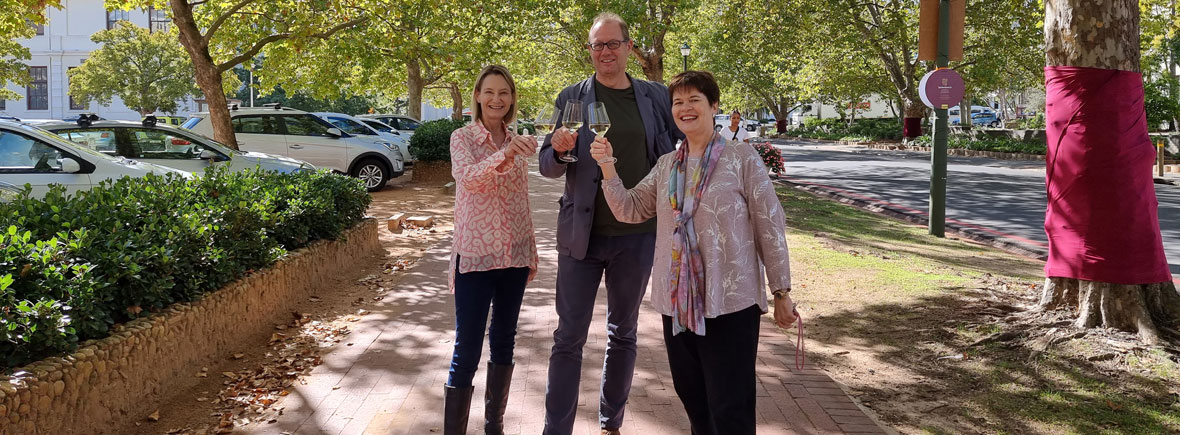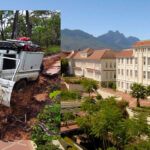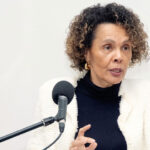
Frontier ‘Eco2Wine’ EU Horizon Europe Doctoral Training Network project set to boost innovation and communication in winemaking
Toasting to the future success of ‘Eco2Wine’: Dr Karien O’Kennedy, Winetech; Professor Florian Bauer, South African Grape and Wine Research Institute (SAGWRI), Stellenbosch University; and Professor Marina Joubert, Centre for Research on Evaluation, Science and Technology (CREST), Stellenbosch University.
Stellenbosch University is part of a consortium of eight academic institutions from around the world that are involved in the science of winemaking and have joined forces to compete successfully for support from the EU. Funding from the EU Horizon Europe Programme will be invested in cutting-edge research, advanced doctoral training and public communication around novel approaches to vine-growing and winemaking. These institutions have also partnered with industry bodies and private companies in the wine industry. The ‘Eco2Wine’ project will kick off at the end of 2023, with about €2.4 million in joint funding over four years. About R10.4 million will be allocated to Stellenbosch University to train two PhD graduates – one each in wine science and science communication – as well as for research and networking activities.
Two Stellenbosch researchers are involved: Professor Florian Bauer, South African Research Chair in Integrated Wine Science, and Professor Marina Joubert, science engagement researcher at the Centre for Research on Evaluation, Science and Technology (CREST).
Coordinated by the University of Milan, the Eco2Wine consortium partners are in wine-growing countries, including Italy, Germany, France, Georgia, Spain, Slovenia and South Africa. Industry partners in South Africa include Winetech, the Research, Development and Innovation partner of the local wine industry, and Reyneke Wines, a local wine farm and cellar pioneering environmentally sustainable approaches.
The science objective of the Eco2Wine project is to harness the microbial biodiversity that is naturally associated with healthy vines and vineyards as a tool for innovation in winemaking. The aim is to produce sustainable, eco-friendly wines while improving vineyard management and offering consumers a broader choice of wines.
“By understanding the interactions between the multitude of fungi, yeasts and bacteria that are involved in winemaking, we believe we can make the process more sustainable and produce excellent wines more sustainably and with novel characteristics,” explains Professor Bauer. “Our focus will be on delivering innovative wines of high quality that are produced in environmentally friendly ways and that can compete on international markets.” To do this, we need to map and understand the complex functions and interactions of microbes throughout the winemaking process from vineyards to cellars, he adds.
In addition to science skills, the PhD candidates trained via this project will acquire advanced skills in science communication and community engagement. “This is an interesting new approach to combining a science focus with science communication, thereby allowing natural and social scientists to join forces,” notes Lizel Senekal of the Division for Research Development at Stellenbosch University. “We believe this will become the norm in future projects of this nature.”
The study of the dynamics within communities of microbes is known as ‘microbiomics’, Professor Joubert explains. “This is a cutting-edge and complex field of science, and it can be challenging to make new advances and applications relevant and accessible to industry members and consumers,” she explains. “However, these novel wines can only succeed with support from all stakeholders along the winemaking chain. Therefore, ongoing and pro-active engagement and dialogue with all relevant role players will be essential, including co-creating new solutions and approaches with winemakers.”
“As far as consumer preferences go, we know that nowadays people are looking for high-quality wines that also satisfy an emotional need, for example, a positive mood change,” Professor Bauer adds. “This means that they choose wines that match their values and preferences, and consumers are increasingly seeking natural and eco-friendly options.”
In line with the novel scientific approach, the Eco2Wine project will focus on novel and creative public communication and engagement approaches, including digital storytelling, virtual displays and science-art linkages, and efforts to involve relevant groups in co-creating new ideas and knowledge. The team will also ensure ongoing sharing of progress and outcomes via mainstream and social media.
Enquiries:
Professor Florian Bauer: fb2@sun.ac.za
Professor Marina Joubert: marinajoubert@sun.ac.za



